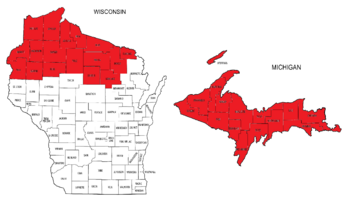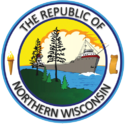Superior: Difference between revisions
No edit summary |
No edit summary |
||
| Line 24: | Line 24: | ||
|government_type = Provisional Presidential Republic<!--(often a compound multi-wikilinked term, e.g. "Federal semi-presidential constitutional republic", etc)--> | |government_type = Provisional Presidential Republic<!--(often a compound multi-wikilinked term, e.g. "Federal semi-presidential constitutional republic", etc)--> | ||
|leader_title1 = Provisional President<!--(for a country, usually the head of state's (wikilinked) title, e.g. "President", "Monarch")--> | |leader_title1 = Provisional President<!--(for a country, usually the head of state's (wikilinked) title, e.g. "President", "Monarch")--> | ||
|leader_name1 = | |leader_name1 = William Arthur Kinnard | ||
|leader_title2 = Provisional Deputy-President<!--(could be "Vice President", otherwise "Prime Minster", etc, etc)--> | |leader_title2 = Provisional Deputy-President<!--(could be "Vice President", otherwise "Prime Minster", etc, etc)--> | ||
|leader_name2 = Edwin Mills | |leader_name2 = Edwin Mills | ||
| Line 30: | Line 30: | ||
|upper_house = <!--Name of governing body's upper house, if given (e.g. "Senate")--> | |upper_house = <!--Name of governing body's upper house, if given (e.g. "Senate")--> | ||
|lower_house = <!--Name of governing body's lower house, if given (e.g. "Chamber of Deputies")--> | |lower_house = <!--Name of governing body's lower house, if given (e.g. "Chamber of Deputies")--> | ||
|sovereignty_type = Independence from [ | |sovereignty_type = Independence from [[Great Lakes Federation]]<!--Brief description of country/territory's status ("Independence [from...]", "Autonomous province [of...]", etc)--> | ||
|established_event1 = <!--First key event in history of country/territory's status or formation--> | |established_event1 = <!--First key event in history of country/territory's status or formation--> | ||
|established_date1 = <!--Date of first key event--> | |established_date1 = <!--Date of first key event--> | ||
| Line 60: | Line 60: | ||
}} | }} | ||
'''Northern Wisconsin''' officially the '''Republic of Northern Wisconsin''' is a self-proclaimed [https://en.wikipedia.org/wiki/Secession breakaway state] in | '''Northern Wisconsin''' officially the '''Republic of Northern Wisconsin''' is a self-proclaimed [https://en.wikipedia.org/wiki/Secession breakaway state] in the [https://en.wikipedia.org/wiki/Midwestern_United_States midwest region] of North America. It lies between the [[Republic of the Heartland]] and the [[Great Lakes Federation]] and [https://en.wikipedia.org/wiki/Lake_Superior Lake Superior], occupying an area of 92,830 km2 (35,841 sq mi), with a population of about 661,000. Northern Wisconsin declared its independence from the Great Lakes Federation two years after [[the shattering]] and has since gained no diplomatic recognition as a sovereign state. Most of Northern Wisconsin is covered in a mixture of plains and fields and dense forests. Its capital is Iron Mountain and largest city is Superior. | ||
==History== | ==History== | ||
The | ===The Shattering=== | ||
Following a disputed election, and a tie vote, the [https://en.wikipedia.org/wiki/United_States_Congress U.S. Congress] installs the most unpopular President in U.S. history, as [[David Jefferson Adams]] becomes the 44th President of the United States. Shortly after the election, increased unrest, rioting, and a growing number of militias have given rise to ever-increasing domestic terrorism. In response, the President invokes the Homeland Security Act, and declares martial law on the West Coast, and other areas of the country. Though highly contested, a Supreme Court ruling sidesteps the electoral process, disqualifying popular Presidential candidates from several states. Public outrage explodes when a sham election leads to incumbent David Adams accepting a second term in office. During the 57th Inauguration Day ceremonies, Washington, D.C. is struck by a [https://en.wikipedia.org/wiki/Tactical_nuclear_weapon low-yield nuclear weapon], killing David Adams and most of the U.S. Congress. The destruction of Washington, D.C. effectively breaks the chain of succession, sending the nation into chaos. In an emergency vote, NATO deploys peacekeepers to the greater D.C. area, to secure international interests. With separatist sentiment rising, [https://shatteredunion.fandom.com/wiki/California_Commonwealth California]'s governor declares home rule, and secedes from the Union. Texas follows quickly, and declares sovereignty, taking neighboring states with them and forming the [https://shatteredunion.fandom.com/wiki/Republic_of_Texas Republic of Texas]. Following suit, other separatist movements gave rise to [[Cascadia]], the [[Republic of the Heartland]], [[Great Lakes Federation]], [[Georgia Federation]] and [[New England]]. | |||
===Secession within secession=== | |||
The idea of the republic originated from a little known man named William Arthur Kinnard. | |||
==Geography== | ==Geography== | ||
==Politics== | ==Politics== | ||
==Military== | ==Military== | ||
Armed miltia groups and separatists are split into dozens of guerilla groups of various sizes, most of which are a part of the [[Northern Wisconsin State Defence Force]] under the provisional government. The state militia consists only of volunteer units. Provisional president Wayne Kirkham had created a legal framework for local militia companies to organize, drill, and serve as a home guard unit capable of handling state emergencies under the assistance and supervision of county sheriffs offices. Reports estimate that around 6,000 to 7,000 individuals are active militiamen, with a reserve force of 13,000 to 15,000. Most militiamen are stationed at strategic locations in Northern Wisconsin including (but not limited to) power plants, airports, harbors, police stations, courts, former [https://en.wikipedia.org/wiki/Wisconsin_Army_National_Guard Wisconsin National Guard] armories, municipal buildings and newspaper and radio stations. | Armed miltia groups and separatists are split into dozens of guerilla groups of various sizes, most of which are a part of the [[Northern Wisconsin State Defence Force]] under the provisional government. The state militia consists only of volunteer units. Provisional president Wayne Kirkham had created a legal framework for local militia companies to organize, drill, and serve as a home guard unit capable of handling state emergencies under the assistance and supervision of county sheriffs offices. Reports estimate that around 6,000 to 7,000 individuals are active militiamen, with a reserve force of 13,000 to 15,000. Most militiamen are stationed at strategic locations in Northern Wisconsin including (but not limited to) power plants, airports, harbors, police stations, courts, former [https://en.wikipedia.org/wiki/Wisconsin_Army_National_Guard Wisconsin National Guard] armories, municipal buildings and newspaper and radio stations. The Northern Wisconsin Naval Militia has around 500 volunteers. The Northern Wisconsin Civil Air Patrol handles the management and security of airfields in the republic. | ||
The Northern Wisconsin Naval Militia has around 500 volunteers. The Northern Wisconsin Civil Air Patrol handles the management and security of airfields in the republic. | |||
==Economy== | ==Economy== | ||
==Demographics== | ==Demographics== | ||
==Culture== | ==Culture== | ||
Revision as of 13:59, 14 April 2022
This article is incomplete because it is pending further input from participants, or it is a work-in-progress by one author. Please comment on this article's talk page to share your input, comments and questions. Note: To contribute to this article, you may need to seek help from the author(s) of this page. |
Republic of Northern Wisconsin | |
|---|---|
|
Flag | |
| Motto: Our right, our land! | |
 | |
| Capital | Iron Mountain |
| Largest city | Superior |
| Official languages | English |
| Demonym(s) | Wisconsinite |
| Government | Provisional Presidential Republic |
• Provisional President | William Arthur Kinnard |
• Provisional Deputy-President | Edwin Mills |
| Legislature | Provisional State Council |
| Independence from Great Lakes Federation | |
| Area | |
• Total | 35,841 sq mi (92,830 km2) |
| Population | |
• 2020 estimate estimate | 661,807 |
• Density | 18.4/sq mi (7.1/km2) |
| Currency | Northern Wisconsin Dollar |
| Time zone | CST |
| Date format | dd-mm-yyyy |
| Driving side | right |
| Internet TLD | .nw |
Northern Wisconsin officially the Republic of Northern Wisconsin is a self-proclaimed breakaway state in the midwest region of North America. It lies between the Republic of the Heartland and the Great Lakes Federation and Lake Superior, occupying an area of 92,830 km2 (35,841 sq mi), with a population of about 661,000. Northern Wisconsin declared its independence from the Great Lakes Federation two years after the shattering and has since gained no diplomatic recognition as a sovereign state. Most of Northern Wisconsin is covered in a mixture of plains and fields and dense forests. Its capital is Iron Mountain and largest city is Superior.
History
The Shattering
Following a disputed election, and a tie vote, the U.S. Congress installs the most unpopular President in U.S. history, as David Jefferson Adams becomes the 44th President of the United States. Shortly after the election, increased unrest, rioting, and a growing number of militias have given rise to ever-increasing domestic terrorism. In response, the President invokes the Homeland Security Act, and declares martial law on the West Coast, and other areas of the country. Though highly contested, a Supreme Court ruling sidesteps the electoral process, disqualifying popular Presidential candidates from several states. Public outrage explodes when a sham election leads to incumbent David Adams accepting a second term in office. During the 57th Inauguration Day ceremonies, Washington, D.C. is struck by a low-yield nuclear weapon, killing David Adams and most of the U.S. Congress. The destruction of Washington, D.C. effectively breaks the chain of succession, sending the nation into chaos. In an emergency vote, NATO deploys peacekeepers to the greater D.C. area, to secure international interests. With separatist sentiment rising, California's governor declares home rule, and secedes from the Union. Texas follows quickly, and declares sovereignty, taking neighboring states with them and forming the Republic of Texas. Following suit, other separatist movements gave rise to Cascadia, the Republic of the Heartland, Great Lakes Federation, Georgia Federation and New England.
Secession within secession
The idea of the republic originated from a little known man named William Arthur Kinnard.
Geography
Politics
Military
Armed miltia groups and separatists are split into dozens of guerilla groups of various sizes, most of which are a part of the Northern Wisconsin State Defence Force under the provisional government. The state militia consists only of volunteer units. Provisional president Wayne Kirkham had created a legal framework for local militia companies to organize, drill, and serve as a home guard unit capable of handling state emergencies under the assistance and supervision of county sheriffs offices. Reports estimate that around 6,000 to 7,000 individuals are active militiamen, with a reserve force of 13,000 to 15,000. Most militiamen are stationed at strategic locations in Northern Wisconsin including (but not limited to) power plants, airports, harbors, police stations, courts, former Wisconsin National Guard armories, municipal buildings and newspaper and radio stations. The Northern Wisconsin Naval Militia has around 500 volunteers. The Northern Wisconsin Civil Air Patrol handles the management and security of airfields in the republic.
